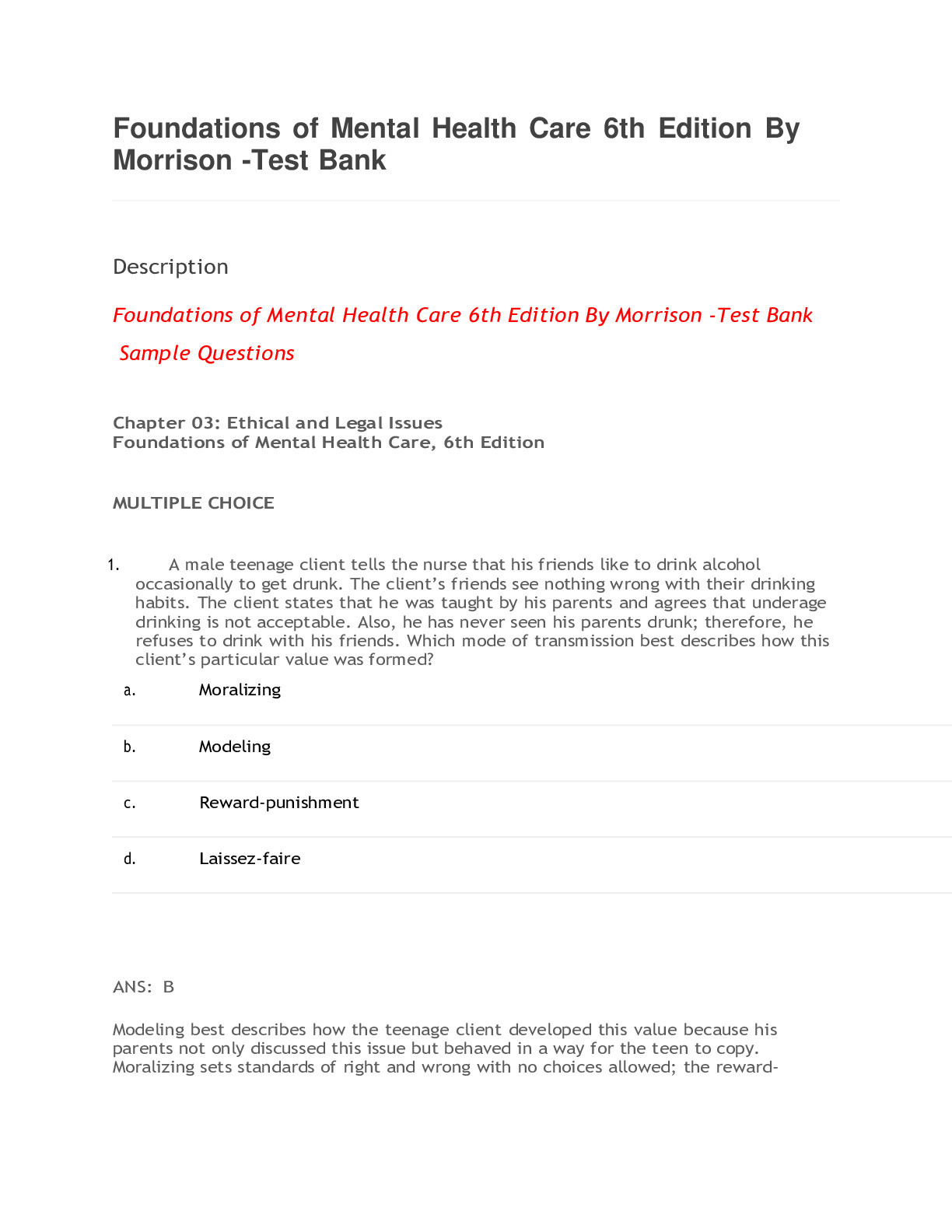All study resources > Foundations of Mental Health Care 6th Edition By Morrison -Test Bank (Nursing)
Foundations of Mental Health Care 6th Edition By Morrison -Test Bank
1. A male teenage client tells the nurse that his friends like to drink alcohol
occasionally to get drunk. The client’s friends see nothing wrong with their drinking
habits. The client states that he was taught by his parents and agrees that underage
drinking is not acceptable. Also, he has never seen his parents drunk; therefore, he
refuses to drink with his friends. Which mode of transmiss
...[Show More]
1. A male teenage client tells the nurse that his friends like to drink alcohol
occasionally to get drunk. The client’s friends see nothing wrong with their drinking
habits. The client states that he was taught by his parents and agrees that underage
drinking is not acceptable. Also, he has never seen his parents drunk; therefore, he
refuses to drink with his friends. Which mode of transmission best describes how this
client’s particular value was formed?
a. Moralizing
b. Modeling
c. Reward-punishment
d. Laissez-faire
2. A female client becomes combative when the nurse attempts to administer
routine medications. The nurse would like to ignore the client but chooses to talk with
the client to calm her. The nurse is successful in calming the client, and the client
takes her medications. What process best describes how the nurse decided on the
course of action taken?
a. Values clarification
b. Nurse’s rights
c. Beliefs
d. Morals
3. Twenty-three states have enacted mental health parity laws. The most accurate
description of these laws is that they require insurance companies to:
a. Include coverage for mental illness
b. Include coverage for substance abuse treatment
c. Include coverage for mental illness that is equal to coverage for physical illness
d. Include coverage for outpatient therapy for individuals with substance abuse
4. The client is feeling very anxious and has requested that a p.r.n. antianxiety
medication be ordered. The nurse informs the client that the medication can be
administered only every 4 hours and was given 3 hours ago. The nurse promises to
give the client the medication as soon as it is due, but the nurse goes to lunch 1 hour
later without giving the client the medication. Which ethical principle did the nurse
violate?
a. Fidelity
b. Veracity
c. Confidentiality
d. Justice
5. A male client is seeking help in a mental health clinic for anger management
problems. He voices that he is fearful that his wife may divorce him because of his
anger problem, and he is willing to do “whatever it takes” to control his anger. Later
in the week, the client’s wife also seeks assistance because she is going to divorce
her husband. The nurse who is caring for both of these clients tries to decide the
correct action to take. The nurse is experiencing:
a. A moral dilemma
b. Value clarification
c. An ethical conflict (or dilemma)
d. A breach of confidentiality
6. The psychiatrist asks the nurse to perform a procedure that she is not familiar
with, and the nurse is unsure whether this is something within the scope of practice.
Where can the nurse find the answer to her question?
a. National nurse practice act
b. State nurse practice act
c. Regional nurse practice act
d. Community nurse practice act
7. An order written by a physician is reviewed by the nursing staff, and no one is
familiar with the treatment instructions. A nurse who was recently hired knows that
this treatment is covered by the state’s nurse practice act. What is the nurse’s best
course of action?
a. Call the physician to ask for clarification
b. Check the state’s nurse practice act again
c. Contact the nursing supervisor for approval to carry out the treatment
d. Refer to the facility’s policy and procedure to determine the course of action
8. Standards of nursing practice for mental health can best be described as helping
to ensure:
a. That certain clients receive care
b. Quality and effectiveness of care
c. Proper documentation
d. Proper medication administration
[Show Less]
